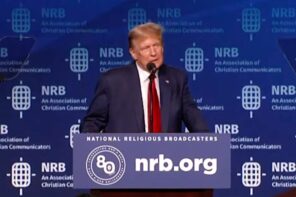Donald Trump’s speech to the annual Family Research Council-sponsored Values Voters Summit on Friday suggests the growing success of the Republican candidate’s move to shore up his evangelical base. There hasn’t been a pivot, but the campaign team has managed to hit the “partly reset” button—at least as long as they can keep their boss’s itchy fingers off Twitter.
Whether this will sway the fracturing of a considerable number of Catholic voters from that base, however, remains dubious. His address to the group also shows his evolution into someone less ill-at-ease with Bible verses and more attuned to the language of America as a Christian nation. Little wonder than the newly bonded duo of Eric Metaxas and David Barton have positioned themselves on the team’s offensive line.
Religious right stalwart Gary Bauer warmed up the audience by comparing the election to Flight 93, a new standard even for the hyperbolic rhetoric of evangelical supporters of Trump, who previously have called his rhetoric “Churchillian” and warned that this election could be the final nail in the coffin of American liberty.
Ladies and gentlemen, this is a Flight 93 election. This may be our last shot. It’s time to roll. It’s time to run down the aisle and save western civilization . . . This country is the equivalent of that hijacked plane right now. We’re headed to a disaster, unless we can get control of the cockpit again.
Trump made clear what it meant to save Western Civilization. In a nutshell, it is to resurrect and defend “our Christian heritage,” and protect children from a media culture of mockery. Trump will tell the media culture, “you’re fired!”
TRUMP: Yet, our media culture often mocks and demeans people of faith. And you understand that. All the time I hear from concerned parents how much harder it is for a Christian family to raise their children in today’s media environment.
AUDIENCE MEMBER: Right!
TRUMP: It is right, isn’t it? Yeah, it is right. Not even close. Your values of love, charity and faith built this nation. .. . So let me say this right up front: A Trump administration, our Christian heritage will be cherished, protected, defended, like you’ve never seen before. Believe me. I believe it. And you believe it. And you know it. You know it. And that includes religious liberty.
Defending religious liberty, as he’s said before, means repealing the (once obscure) “Johnson amendment” from 1954, under which ministers can lose tax-exempt status for their churches when they specifically advocate for particular candidates in the pulpit, as opposed to just making their views known generally in the public arena. And, as per usual, Trump turned a carefully worded rule about what does and does not qualify for tax-exemption within religious institutions, into a series of fact-free flights about the muzzling of Christian speech:
The first thing we have to do is give our churches their voice back. It’s been taken away. The Johnson amendment has blocked our pastors and ministers and others from speaking their minds from their own pulpits. If they want to talk about Christianity, if they want to preach, if they want to talk about politics, they’re unable to do so. If they want to do it, they take a tremendous risk that they lose their tax-exempt status.
All religious leaders should be able to freely express their thoughts and feelings on religious matters.
From there, candidate Trump moved through the fairly customary laundry list of Republican talking points—school choice, Hillary’s emails, the secret plan to defeat ISIS, the need for a conservative to appoint the Scalia replacement, Hillary’s responsibility for North Korea’s nukes, and so on and on. By comparison with his summer addresses to campaign crowds, bent on attacking fire marshals and Gold Star mothers, sticking to the teleprompter appeared to work to keep him mostly within the bounds of the standard discourse of the right.
The argument that continues to trump all others, however, remains the Supreme Court. Even those uneasy enough with Trump to avoid mentioning him personally continue to fall back on the issue of court appointments, and Trump reinforced that skillfully. “This [election] will determine whether or not we remain a constitutional republic,” he told the crowd, stressing Antonin Scalia as the model to follow for picking any future justice.
Senator James Lankford, a Southern Baptist leader from Oklahoma who has emerged as a Tea Party favorite, repeated the message. “Really clear vision for a strong America tonight from Trump” he tweeted after Trump’s acceptance speech at the RNC, a dark and nasty address even by the low standards set by that strange gathering.
The firming up of support from former Cruz voters appears to be having some effect on the strengthening of Trump’s polling. As one attendee put it, noting his former skepticism towards Trump:
God has used different people throughout the course of history, especially during Biblical times—the strangest people, do the most enormous things in our world . . . And so the fact that [God] might choose a Donald Trump in this country that other presidents and other politicians have not been able to step up and do, would not be surprising to me at all.
Trump’s weakness among Catholics remains evident, and perhaps the single largest drag on shoring up what should be his base. Evangelicals, Catholics, and Mormons are certainly not gathering together in this electoral cycle as they did in the glory days of the rise of the religious right. In the meantime, if Trump hasn’t pivoted, Protestant conservatives have, and Trump’s electoral prospects appear to be resuscitating a bit after a near-death experience in August.




